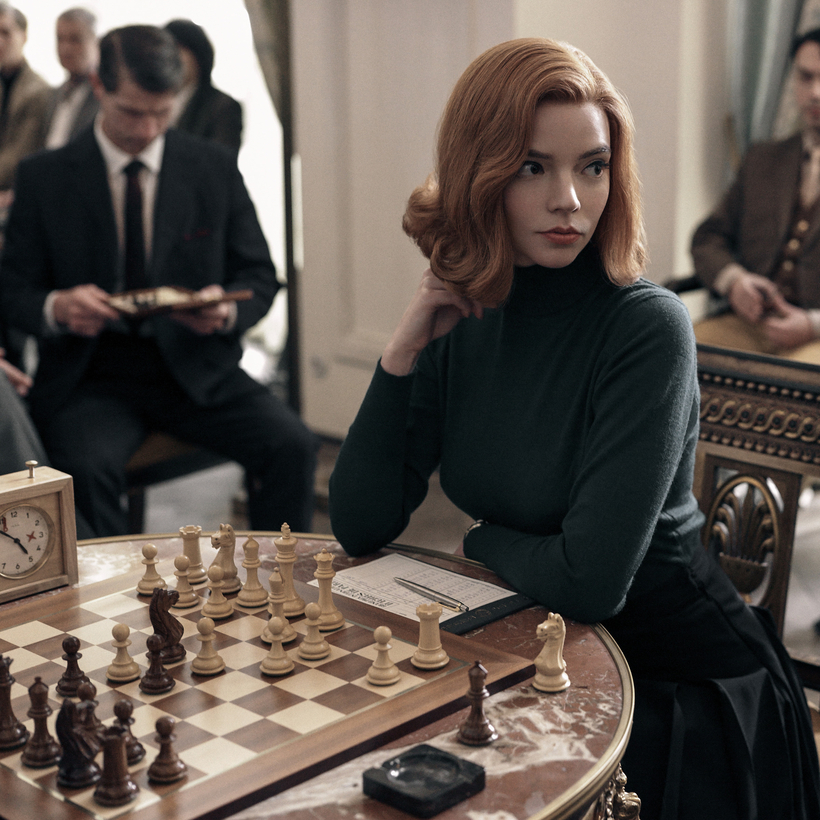It is the boxset binge hit of lockdown 2.0 — the riveting tale of a Kentucky chess prodigy who emerges from a 1950s orphanage to crush Cold War grandmasters with a nuclear stare and killer wardrobe.
But The Queen’s Gambit is more than a glossy triumph for Netflix; it is also shaking up chess, thrusting geeks into prime time, triggering a run on chessboards — and highlighting persistent sexism in the game.
In the drama, Beth Harmon — played by Anya Taylor-Joy, a rising British-Argentine star — is constantly blocked and checked as she powers through the male-dominated chess ranks.
Real-life players have praised the accuracy of the show’s tense matches — having the former world No 1 Garry Kasparov as a consultant helped — but also its depiction of a chasmic gender gap.

The sexist comments Harmon receives in the programme are minor compared with what real female chess players have had to put up with, says Judit Polgár. In 1991, the Hungarian became the world’s youngest grandmaster at 15, narrowly breaking a record set in 1958 by the American prodigy Bobby Fischer.
As recently as 2015, Nigel Short, Britain’s greatest chess player, said that “men and women’s brains are hard-wired very differently” and that the chess world should stop “fretting about inequality”.
Kasparov said in 1990 of a 12-year-old Polgár: “She has fantastic chess talent, but she is, after all, a woman. It all comes down to the imperfections of the feminine psyche. No woman can sustain a prolonged battle.”
Polgár, now 44, went on to beat Kasparov, snubbing ladies’ tournaments as she ate grandmasters for breakfast with a silent aggression that will be familiar to viewers of The Queen’s Gambit. The British grandmaster David Norwood once described his Hungarian victor as “a cute little auburn-haired monster”.
The Queen’s Gambit is more than a glossy triumph for Netflix; it is also shaking up chess, thrusting geeks into prime time, triggering a run on chessboards — and highlighting persistent sexism in the game.
“Of course these ideas come from his education and the society he lived in,” Polgár says of Kasparov, who later accepted there were “no inherent limitations” to her talent — “an idea that many male players refused to accept until they had unceremoniously been crushed by a 12-year-old with a ponytail”.
Yet structural barriers that have nothing to do with neurons persist. When Polgár retired in 2015 to run her own chess foundation, Hou Yifan of China became the only woman in the world top 100.
“At the British championships last year, there were about five of us and 80 men,” says Sarah Longson, a former child prodigy who runs the UK Schools’ Chess Challenge, a junior tournament.

Longson, 32, says child participation is now equal until perceptions deter teenage girls. “I remember one of my friends saying, ‘Why am I putting lip gloss on to go to a pub to play with old men?’” she says.
Female players now hope Harmon’s glamour and ruthless cool (we’ll look past the character’s substance abuse) will inspire girls to stick with the game.
Taylor-Joy, 24, pushed back when The Queen’s Gambit’s creator, Scott Frank, worried if Harmon was too glamorous. “Women still get told you’re a beauty or a brain and it’s massively damaging,” she says. “They’re not mutually exclusive.”
Taylor-Joy, who role-played Shakespeare with chess pieces as a child, is herself a convert to the game. “I learnt Beth’s strong openings but then things start to fall apart,” she says.
The actor is not alone. Sales of chess sets are up 130% at John Lewis, and tutors are fielding inquiries from nostalgic parents. Online chess is booming.
Tim Walker, a writer from London, bought a chess set last week for his daughter Peggy, 5, hoping to bond over a new screen-free pursuit.
“It reminded me of chess at school and showed that it isn’t just for pale-faced geeky boys,” Walker, 39, says of the show, in which Harmon learns moves from the orphanage caretaker. “I think Peggy will grasp the basics, but she hasn’t quite mastered the Sicilian Defence.”

The British women’s champion, Jovanka Houska, has enjoyed watching chess blow up on Instagram, where Harmon is a feminist icon. Last week, Magnus Carlsen, the Norwegian reigning world No 1, Photoshopped himself into a chess scene from the series, opposite Harmon. “I think it would be close,” he wrote of his chances against her, with a winky-face emoji.
Houska, 40, has also used fiction to shift perceptions. In her 2016 novel The Mating Game, now being developed for the screen, Ivana Jones sets out to become a grandmaster while falling in love with a Frenchwoman, a Russian billionaire and “Norwegian sex-god Sven”.
“Ivana is independent and determined, just like Beth, but a bit raunchier and without the drugs,” says Houska, who has little time for the dinosaurs of the game.
“I’d much prefer to hear a woman talking about her experience than a man telling us that our brains are different,” she adds.

